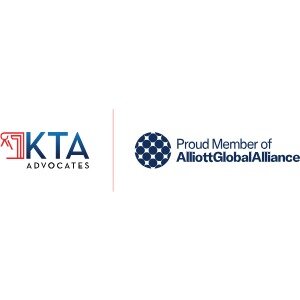Best Sanctions & Export Controls Lawyers in Kampala
Share your needs with us, get contacted by law firms.
Free. Takes 2 min.
List of the best lawyers in Kampala, Uganda
About Sanctions & Export Controls Law in Kampala, Uganda
Sanctions and export controls law in Kampala, Uganda refers to the rules, regulations, and policies that govern the international trade of goods, technology, and services. These laws are designed to comply with international obligations, such as those imposed by the United Nations, African Union, or other global bodies, as well as national priorities. They may include restrictions on exporting certain products, prohibitions on trade with specific countries, or requirements for licenses when dealing with controlled items. In Kampala, these regulations are enforced by both national and international agencies, with the goal of ensuring that Uganda does not support activities such as terrorism, proliferation of weapons, or violations of international law.
Why You May Need a Lawyer
There are several reasons why individuals and businesses in Kampala might need legal advice concerning sanctions and export controls:
- You may be planning to import or export goods, technology, or services and want to confirm compliance with local and international laws.
- Your business may have been approached by foreign partners, and you want to ensure that all parties comply with relevant sanctions and trade regulations.
- You could be subject to a government investigation or audit concerning your trade activities.
- You may have received government notifications about sanctions violations or export control breaches.
- You need guidance on acquiring the appropriate licenses or permits for dual-use goods or restricted commodities.
- You need to train your staff to avoid unintentional violations of sanctions laws.
- Your transactions involve countries or entities that are subject to international sanctions.
Local Laws Overview
Uganda’s approach to sanctions and export controls is guided by the Constitution of Uganda, the East African Community (EAC) protocols, and obligations under international law. Major legal instruments and authorities involved include:
- Uganda Revenue Authority (URA): Regulates customs and enforces trade compliance, including sanctions and export controls at border points.
- Ministry of Trade, Industry and Cooperatives: Issues policies and regulations for trade, including licensing for certain exports or imports.
- Anti-Money Laundering Act: Prohibits dealings with individuals or organizations sanctioned for terrorism or other crimes.
- Import and Export Control Act: Governs which goods and technologies require permits for export, with special attention to arms, chemicals, and sensitive technologies.
- International Obligations: Uganda often enforces sanctions passed by the United Nations Security Council and regional bodies, restricting trade with specified countries or entities.
Frequently Asked Questions
What are sanctions and export controls?
Sanctions are legal measures restricting trade or financial dealings with specific countries, entities, or individuals, often for security or political reasons. Export controls are regulations that limit the export of certain goods, technology, and services to protect national interests or comply with international agreements.
Who enforces sanctions and export controls in Uganda?
Main enforcement is handled by the Uganda Revenue Authority, the Ministry of Trade, Industry and Cooperatives, and law enforcement agencies. Uganda also enforces some international sanctions in compliance with global commitments.
Do I need a license to export certain goods?
Yes. Certain goods such as arms, dual-use items, chemicals, and technologies may require export licenses from the appropriate regulatory authority before being shipped abroad.
What penalties can result from violating sanctions or export controls?
Penalties include confiscation of goods, significant fines, loss of licenses, and in severe cases, criminal prosecution and imprisonment.
How can I determine if my business partner is subject to sanctions?
You should conduct due diligence by checking government and international lists of sanctioned individuals and entities. A lawyer can assist in screening procedures to ensure compliance.
Do Ugandan businesses have to comply with international sanctions?
Yes. When Uganda adopts international sanctions, either through United Nations resolutions or regional agreements, these become binding on all entities operating within Uganda.
Are there specific industries that are more affected by sanctions and export controls?
Yes. Sectors such as defense, technology, telecommunications, chemicals, and financial services are particularly regulated and closely monitored for compliance.
Can an individual be penalized for unintentional breaches?
While intent is considered, individuals can still face penalties for negligence or lack of proper compliance processes, even if violations were not intentional.
How do I apply for an export license in Uganda?
Applications are typically submitted to the Ministry of Trade, Industry and Cooperatives or other relevant regulatory authorities, depending on the nature of the goods or technology. The process may require documentation and background checks.
What should I do if I receive a government notice about sanctions or export controls violation?
You should promptly consult a qualified lawyer experienced in sanctions and export controls. Do not ignore the notice, as delays can increase legal and financial risks.
Additional Resources
If you need further assistance or information, consider reaching out to the following organizations in Uganda:
- Uganda Revenue Authority (URA): For inquiries on customs, export controls, and compliance.
- Ministry of Trade, Industry and Cooperatives: For export licensing, trade regulations, and permits.
- Directorate of Public Prosecutions: For legal guidance in case of prosecution concerns.
- Uganda Law Society: For referrals to qualified legal practitioners in the field.
- Financial Intelligence Authority: For information on anti-money laundering regulations and sanctions screening.
Next Steps
If you are seeking legal assistance in sanctions and export controls in Kampala, Uganda, consider the following steps:
- Clearly identify the nature of your query or the issue at hand. Gather all relevant documents and correspondence.
- Reach out to a qualified lawyer or a law firm experienced in international trade, export controls, and sanctions law.
- Request an initial consultation to discuss your situation, legal risks, and possible solutions.
- Follow the guidance on compliance programs, due diligence, licensing requirements, or defense strategies as advised by your lawyer.
- If necessary, engage in training for your staff or business partners to ensure ongoing compliance.
- Stay informed of updates to local and international sanctions lists or export controls regulations relevant to your activities.
Lawzana helps you find the best lawyers and law firms in Kampala through a curated and pre-screened list of qualified legal professionals. Our platform offers rankings and detailed profiles of attorneys and law firms, allowing you to compare based on practice areas, including Sanctions & Export Controls, experience, and client feedback.
Each profile includes a description of the firm's areas of practice, client reviews, team members and partners, year of establishment, spoken languages, office locations, contact information, social media presence, and any published articles or resources. Most firms on our platform speak English and are experienced in both local and international legal matters.
Get a quote from top-rated law firms in Kampala, Uganda — quickly, securely, and without unnecessary hassle.
Disclaimer:
The information provided on this page is for general informational purposes only and does not constitute legal advice. While we strive to ensure the accuracy and relevance of the content, legal information may change over time, and interpretations of the law can vary. You should always consult with a qualified legal professional for advice specific to your situation.
We disclaim all liability for actions taken or not taken based on the content of this page. If you believe any information is incorrect or outdated, please contact us, and we will review and update it where appropriate.













